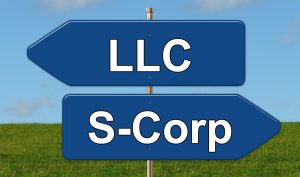Written by: Business Advisor Peter Harriman

Congrats! You are thinking of getting into business! Or you are in business already but wondering if your business is operating under the right type of business! You are looking online to try to figure out the ins– and outs of which business entity formation is best for you, and you are coming to a road block. There are a lot of choices; sole proprietor, partnership, limited liability company (LLC), c- corp, etc. The complexity of the topic should prompt a call to some kind of legal professional to ensure you understand the decision and how it will affect you and your business.
One business entity you might want to discuss during this conversation is the LLC that is taxed like an S-Corp. This article will discuss some general pros and cons of this election, but (again) it is meant as a discussion point with a legal professional. Your accountant will also want to weigh in on the topic too, more on that later.
Disclaimer: I am neither a lawyer nor an accountant. I am a business adviser in the Portland, Maine office for the Small Business Development Center. I have talked with over one hundred entrepreneurs over the past year. The two most common business entities that I hear discussed are the LLC and the S-Corp. Often, they are discussed as two distinctly separate choices. Very rarely do I find either clients or articles that discuss the ability for an LLC to be taxed like an S-Corp. This prompted me to write this article as I feel it is worth some discussion.
The often cited advantages of having an LLC in numerous articles and papers are the following:
- with proper setup, the potential to limit liability to only the business assets
- flexibility of operations
- fewer rules and regulations versus the Corporation status
- pass through entity, meaning that income is traditionally “passed through” to the owners, which eliminates potential “double” taxation.
If you elected to be an LLC with S-Corp status, many of these advantages would remain. The S-Corp election would mean adhering to a few more rules and regulations versus a straight LLC would need to. Your lawyer would be able to explain those in detail.
In my opinion, the most pronounced difference between the traditional LLC and the LLC taxed as an S-Corp comes down to (obviously) taxes. Generally, with the traditional LLC any net (AFTER Expenses) profit passes through to the owner and is recorded as income. The owner then pays Federal and State Income taxes as well as Self Employment taxes.
Self Employment tax is the Social Security and Medicare taxes. In 2016, employees pay 6.2% towards Social Security and 1.45% towards Medicare. Your employer pays an equal amount that matches what the employee has paid. When you are self employed, you have to pay the employee portion AND the matching employer portion, which adds up to 15.3%!
With S-Corp status, the owner(s) could be considered employees of the company. A reasonable* salary would be paid with the remaining net profit having the ability to be classified as a distribution. According to the IRS, distributions in this manner would not be assessed the Social Security and Medicare taxes (self employment taxes). The distribution WOULD still be assessed federal and state income taxes. This could be a potential tax savings of UP TO 15.3%.
Now, before you get the champagne and celebrate… I said UP TO because there are some additional costs that would be incurred that would eat away at that number. This is where we get into the costs of the LLC with S-Corp status election:
- You now have payroll and payroll taxes that will need to be managed, processed, and filed
- As an employee, most states would require the business to pay unemployment and sometimes workers compensation (varies by state) do you want to note what it is in Maine?
- Your taxes just became a bit more complicated as you now will be filing an 1120S and subsequent forms. Often, this means a higher accountant bill
- Any future Social Security benefit you would receive is related to the reported wages that you pay Social Security taxes on throughout your career. So reducing the amount of income subject to Social Security taxes could also reduce your future benefits
There are definitely some costs to consider prior to making the election. This is a good reason to talk with a legal professional and your accountant. You need to make sure it makes sense.
Finally, I can not finish the article without clarifying “reasonable” salary. Many business owners have gone astray and claimed a lower salary than was “reasonable” in order to benefit on more tax savings (i.e. higher portion of profits being classified as a distribution versus wages). The IRS has many cases concerning this topic. For this reason, I believe that making the LLC taxed as an S-Corp Election hinges on what your “reasonable” salary is determined to be and how well your business is doing/will do. This is why it is imperative to discuss this option with both a legal professional and your accountant. The accountant will be able to better tell you the true tax savings from a numbers perspective.
Peter Harriman is a certified business advisor at the Maine Small Business Development Center at the University of Southern Maine. He can be reached at peter.harriman@maine.edu.
is a certified business advisor at the Maine Small Business Development Center at the University of Southern Maine. He can be reached at peter.harriman@maine.edu.